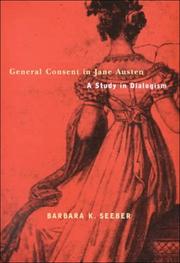| Listing 1 - 2 of 2 |
Sort by
|

ISBN: 1282858734 9786612858734 0773568549 9780773568549 9781282858732 077352066X 9780773520660 6612858737 Year: 2000 Publisher: Montreal Ithaca [NY] McGill-Queen's University Press
Abstract | Keywords | Export | Availability | Bookmark
 Loading...
Loading...Choose an application
- Reference Manager
- EndNote
- RefWorks (Direct export to RefWorks)
General Consent in Jane Austen examines the "early" and "late" novels as well as the juvenilia in the light of three paradigms: "The Other Heroine" focuses on voices that challenge and compete with the central heroines, "Cameo Appearances" examines buried past narratives, and "Investigating Crimes" explores acts of violence. These three avenues into dialogic space destabilize conventional readings of Austen. The Bakhtinian model that structures this book is not one of linearity and balance but one of conflict, simultaneity, and multiplicity. While some novels fit into only one paradigm, others incorporate more than one; Mansfield Park receives the most attention. A bold and provocative study, General Consent in Jane Austen will be of interest not only to Austen scholars but to scholars of literary theory and dialogism.
Consensus (Social sciences) in literature. --- Dialogism (Literary analysis) --- Dialogics (Literary analysis) --- Criticism --- Austen, Jane, --- Ao-ssu-ting, --- Ao-ssu-ting, Chien, --- Aosiding, --- Aosiding, Jian, --- Āsṭin̲, Jēn̲, --- Austenová, Jane, --- Osten, Dzheĭn, --- Ostin, Dzhein, --- Lady, --- Author of Sense and Sensibility, --- Остен, Джейн, --- Остен, Джейм, --- אוסטן, ג׳יין --- אוסטן, ג׳יין, --- أوستن، جين، --- Political and social views. --- Consensus (Social sciences) in literature --- 820 "18" AUSTEN, JANE --- 820 "18" AUSTEN, JANE Engelse literatuur--19e eeuw. Periode 1800-1899--AUSTEN, JANE --- Engelse literatuur--19e eeuw. Periode 1800-1899--AUSTEN, JANE
Book
ISBN: 9781442645561 1442645563 9781487521851 Year: 2016 Publisher: Toronto : University of Toronto Press,
Abstract | Keywords | Export | Availability | Bookmark
 Loading...
Loading...Choose an application
- Reference Manager
- EndNote
- RefWorks (Direct export to RefWorks)
"If there is one sector of society that should be cultivating deep thought in itself and others, it is academia. Yet the corporatisation of the contemporary university has sped up the clock, demanding increased speed and efficiency from faculty regardless of the consequences for education and scholarship. In The Slow Professor, Maggie Berg and Barbara K. Seeber discuss how adopting the principles of the Slow movement in academic life can counter this erosion of humanistic education. Focusing on the individual faculty member and his or her own professional practice, Berg and Seeber present both an analysis of the culture of speed in the academy and ways of alleviating stress while improving teaching, research, and collegiality. The Slow Professor will be a must-read for anyone in academia concerned about the frantic pace of contemporary university life."
Science --- Higher education --- College teaching --- Education, Higher --- Slow life movement --- Time management --- Enseignement universitaire --- Enseignement supérieur --- Slow life (Mouvement) --- Budgets temps --- Philosophy --- Philosophie --- College teachers --- Enseignement supérieur --- Research --- Education --- Recherche --- Éducation --- Social aspects. --- Aspect social. --- Education, Higher - Philosophy --- Science policy --- Éducation
| Listing 1 - 2 of 2 |
Sort by
|

 Search
Search Feedback
Feedback About
About Help
Help News
News